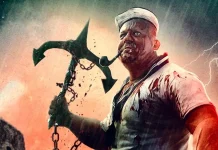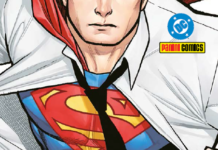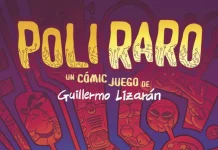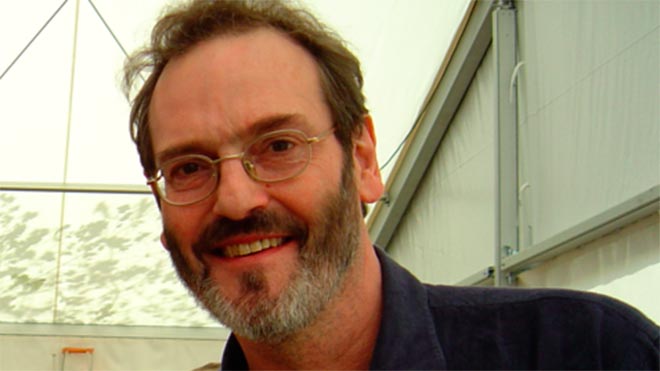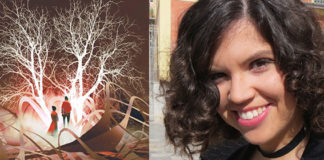(English version of this interview below spanish one) Robert Holdstock nació en 1948 en el condado de Kent (Inglaterra), y tiene una licenciatura en biología, aunque su principal actividad profesional es la escritura desde 1975, en el género fantástico. Sus mayores éxitos provienen de «Bosque Mitago«, Premio Mundial de Fantasía de novela en 1985, y el ciclo relacionado con ella, el de Mitago, donde incide en la exploración de leyendas y mitos. También es autor del ciclo del Códice Merlín, sobre la figura mítica de Arturo.
Explorador incansable del mito y una de las leyendas vivas de la literatura fantástica, decidimos intentar hablar con él, para que nos diese una perspectiva diferente del género, desde su dilatada carrera como escritor. Humilde, gran conversador y amante de la cultura gastronómica española, pasa sus vacaciones en el sur de nuestro país y uno de sus mayores placeres consiste en debatir con otras personas sobre mitos y leyendas.
Ganó los premios British Science Fiction, World Fantasy, Premio de la Academia Checa de Ciencia Ficción, Fantasía y Terror y Premio especial de Grand Prix de L’Imaginaire, pero ciertamente los galardones no cuentan la especial habilidad de este británico a la hora de escribir. Para aquellos que aún no hayan explorado sus mundos fantásticos, Fantasymundo recomienda en especial «Bosque Mitago«, una de las novelas imprescindibles del género. Os dejamos con Holdstock:
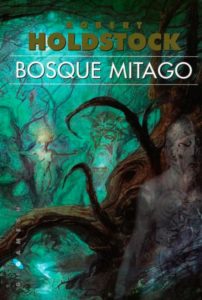 Alejandro Serrano: En primer lugar, señor Holdstock, quisiéramos darle las gracias por atendernos, es un placer conversar con un escritor cuya carrera es muy dilatada en el tiempo. Este hecho le proporciona una perspectiva única de la literatura fantástica. Cualquiera podría decir que el mundo de la fantasía está muy conectado con las tradiciones orales, y centrada en mitos y leyendas. Está usted considerado como un explorador del mito. ¿Porqué eligió esta perspectiva literaria?
Alejandro Serrano: En primer lugar, señor Holdstock, quisiéramos darle las gracias por atendernos, es un placer conversar con un escritor cuya carrera es muy dilatada en el tiempo. Este hecho le proporciona una perspectiva única de la literatura fantástica. Cualquiera podría decir que el mundo de la fantasía está muy conectado con las tradiciones orales, y centrada en mitos y leyendas. Está usted considerado como un explorador del mito. ¿Porqué eligió esta perspectiva literaria?
Robert Holdstock: Siempre me gustaron los mitos y leyendas. Cuando era más joven, mi pasión era la ciencia ficción, que era para mí una especie de mito “futuro”, las historias que aún no se han escrito. Cuando fui por primera vez a Irlanda, descubrí las leyendas de los clanes célticos, y escribí muchos libros usando aquellas leyendas. La fascinación por el pasado siempre ha estado presente en mí. El pasado nos enseña mucho, es una rica fuente de ideas y “sensación de maravilla”. Y por supuesto, gran parte del pasado ha sido borrado u olvidado, así que mi imaginación puede intentar subsanar algo de esa pérdida.
Alejandro Serrano: La literatura y las tradiciones orales son vehículos de conocimiento que transcienden fronteras y creencias. Sin embargo, desde hace años este tipo de transmisión de conocimiento está cambiando, el mundo digital ha abierto su propio camino, con mayores oportunidades que los medios tradicionales. ¿Prefiere el ordenador al papel para escribir, comunicarse y buscar información?
Robert Holdstock: Uso ambos modos. Me encanta escribir en un cuaderno de cuero. Escribí «Bosque Mitago» a mano por primera vez. Pero ahora, cuando paso mis manuscritos al ordenador, también los repaso con él. Para buscar información, prefiero los libros y las enciclopedias, pero Google es una gran herramienta.
Alejandro Serrano: Cuando hablamos sobre Robert Holdstock, es imposible ignorar «Bosque Mitago«. La novela no fuerza nuestras creencias más arraigadas, no rebasa la línea de lo creíble, mantiene la magia hasta el final, dejando un sabor a realidad trastocada que difícilmente parece conciliarse con el género en que la novela habita, la fantasía. Pero lo hace. ¿Cómo lo consiguió? ¿Qué quería conseguir con la primera novela, reivindicar las hitorias orales y los héroes antiguos?
Robert Holdstock: Sí. Quería capturar algo de las tradiciones orales que contaban historias; y por supuesto, recrear viejos héroes,como decía antes, imaginar héroes y heroínas “olvidados”. Con «Bosque Mitago«, quería dar realidad al pasado, pero sobre todo contar una historia humana. No me gusta la fantasía con dragones y magos. Mi fantasía intenta explorar la cultura del mito, todo lo que tenemos en común, no sólo el mito inglés, sino el europeo en su conjunto, además de las leyendas.
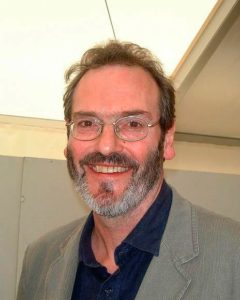 Alejandro Serrano: Le gusta “hervir” al lector a fuego lento, quiere que gradualmente comprenda lo que usted quiere transmitir. No se apresura, sino que espera a que esa comprensión lectora llegue. Sin embargo, el desarrollo de sus novelas no es lento o aburrido. ¿Cómo llega a ese balance?
Alejandro Serrano: Le gusta “hervir” al lector a fuego lento, quiere que gradualmente comprenda lo que usted quiere transmitir. No se apresura, sino que espera a que esa comprensión lectora llegue. Sin embargo, el desarrollo de sus novelas no es lento o aburrido. ¿Cómo llega a ese balance?
Robert Holdstock: Gracias por el cumplido. Sin embargo, la auténtica respuesta a esta pregunta es que “no lo sé”. Simplemente escribo así. Trato de “sentir” el ritmo de mis libros, a veces escribiendo de forma ligera y otras muy dramática.
Alejandro Serrano: Cuando reseñamos «Bosque Mitago« en Fantasymundo, no revelamos casi nada sobre el argumento de la novela, ya que temíamos destruir una valiosa experiencia para los lectores que aún no la habían leído. La reseña se centró en las emociones, sin más detalles. Es quizá el mejor cumplido que pueda hacerse a una novela. ¿Comparte este punto de vista? ¿Qué libros recomendaría como esenciales sin dar detalles de su argumento, cuáles son sus favoritos?
Robert Holdstock: Estoy de acuerdo en que ninguna reseña debe hablar demasiado sobre el argumento, y esto es especialmente válido en las novelas que tienen sorpresas a medio desarrollo y al final. Creo que una novela puede ser resumida perfectamente sin dar detalles, y sí, hay un sentimiento muy emocional en la escritura, que puede ser debatido. Dos de mis libros favoritos son “The Prestige” (“El prestigio”), de Christopher Priest, y “The Mysteries”, de Lisa Tuttle (sólo publicado en los EE.UU.) También una colección de historias sobre las mujeres del Viejo Testamento, “As in Eden”, de R.M.Lamming. Soy fan de Stephen Baxter, que ha escrito dos novelas que me fascinaron: “Evolution” y “The Time Ships”. Me gusta especialmente la segunda, ya que era un gran aficionado a las novelas de H.G.Wells en mi juventud.
Alejandro Serrano: Le gusta la historia, de la que extrae inspiración para sus novelas. En particular, hay un hombre que parece representar casi una obsesión para usted, Arturo, una figura histórica cuya vida y orígenes no parecen muy claros y están sujetos a interpretación. ¿En qué se inspiró para su Arturo? ¿es su figura histórica favorita? ¿porqué?
Robert Holdstock: He escrito sobre Arturo, pero no representa una obsesión para mi. Mi personaje histórico favorito es Ulises, y le sigue muy de cerca Jasón; en cuanto a las mujeres, Medea. Pero me siento muy cercano a Niiv (El Códice Merlín), que no es una figura histórica, pero es maravillosa.
Alejandro Serrano: La tradición griega es una de las grandes referencias cuando hablamos de mitos. De hecho, los libros de “El Códice Merlín” conectan de forma muy directa con la Antigua Grecia. Merlín, Jasón y Medea se ven envueltos en el origen de Inglaterra… ¿Porqué intentó conectar a Inglaterra con la Antigua Grecia? ¿está de acuerdo con J.R.R. Tolkien cuando afirmó que creía que Inglaterra no tenía su propia tradición en mitología?
Robert Holdstock: La mitología de Inglaterra es la mitología de Europa: este país ha sido invadido muchas veces, y los pueblos que venían traían sus propias historias. Lo que siempre me ha interesado es la similitud que guardan en parte las historias célticas (de Gales) con la tradición griega. El ejemplo que siempre utilizo para ilustrarlo es “Los trabajos de Hércules”, muy parecida a una historia galesa de Kylhuk y Olwen, sobre la que escribí en “Gate of Ivory” (el cuarto libro del ciclo Mitago). Los griegos encontraron a los celtas en el tiempo de Alejandro el Grande; estos últimos emigraron al oeste, y llegaron a Inglaterra. Parece natural que se llevasen un recuerdo de la mitología griega y la hiciesen propia. Y cada país tiene su “Robin Hood”. Y cada país tiene su “Arturo”. Tanto Arturo como Ulises son hombres fuertes, cuya debilidad es el orgullo, que son probados hasta el extremo y finalmente salen triunfantes de sus propias debilidades. Una historia muy común.
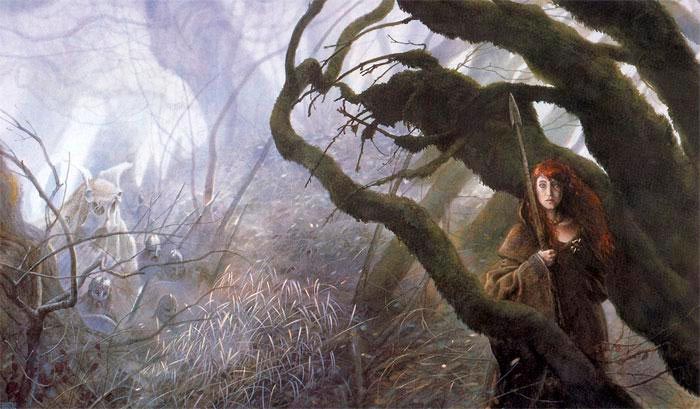
Alejandro Serrano: Le gustan las tradiciones… ¿Viaja lejos para oír el folclore de otros países? ¿Qué países visita más amenudo y qué busca en ellos?
Robert Holdstock: Visito muy amenudo Francia y España. Cuando voy allí intento buscar más arqueología que folclore, pero seguramente preguntaré a mis vecinos españoles cuando vaya para allá (a finales de agosto). Lo que realmente me encanta de la historia antigua de España son las cavernas y sus pinturas rupestres. Hay una montaña, fuera de Ronda, que tiene cinco kilómetros (creo) de pasajes, y las pinturas de hace 30.000 años son maravillosas.
Alejandro Serrano: ¿Ha pensado alguna vez en usar el folclore español para escribir una novela? ¿cuál es el siguiente proyecto de Robert Holdstock?
Robert Holdstock: No lo había pensado, pero como he dicho, investigaré sobre ello y lo intentaré. Mi siguiente proyecto es una secuela de “Avilion”.
Alejandro Serrano: Precisamente publicó el 16 de julio su última novela de Mitago hasta el momento, titulada “Avilion”. Es la primera novela de la serie desde 1997. ¿Será la última de Mitago? ¿Puede contarnos algo sobre ella?
Robert Holdstock: No será la última sobre Mitago, ya que estoy escribiendo la sexta. “Avilion” es la historia de dos niños de Steven Huxley y Guiwenneth («Bosque Mitago«) y sobre los dos lados de su naturaleza, el humano y el mitago, que entran en conflicto. La historia se cuenta en su mayoría cuando son adultos jóvenes. Sus nombres son Jack e Yssobel; precisamente esta última es la protagonista de la secuela que escribo. Me fascina. En “Avilion”, Yssobel explora el corazón del bosque (en Lavondyss) y Jack encuentra el camino hacia nuestro propio mundo. Pero una tragedia les obliga a encontrarse de nuevo.
Alejandro Serrano: Vive en Londres… ¿cómo es un día típico de Robert Holdstock? ¿Qué aficiones tiene aparte de escribir? ¿recibe visitas de lectores?
Robert Holdstock: Un día típico comienza con la lectura del periódico, escribiendo, comiendo fruta, escribiendo de nuevo, leyendo una revista de ciencia o el National Geographic, contesto e-mails, escribo algo más, y luego hago un poco de paella española o boloñesa italiana, dos de mis placeres favoritos. ¿Mis aficiones? Montar en bici, caminar por las lomas, ir al cine, beber cerveza con mis amigos y la arqueología.
Alejandro Serrano: ¿Qué consejo le daría a un escritor que intenta desarrollar su actividad como escritor, comunicarse a través de la literatura?
Robert Holdstock: Que escriba desde el corazón; que no se desanime si falla al primer intento; cuando uno recibe críticas, si parecen acertadas hay que tomar nota de ellas, y si parecen equivocadas, ignorarlas. Que escriba sobre lo que conoce, pero no siempre. Que sea como Neil Young y constantemente encuentre nuevas direcciones.
Alejandro Serrano: Ha sido todo un placer hablar con usted, espero que pase unas buenas vacaciones en nuestro país. ¡Abrazos desde España!
Robert Holdstock: No puedo esperar llegar a Málaga, coger el coche y conducir hasta La Herradura. ¡Una San Miguel y sardinas en la primera noche! Paella el segundo; y tapas en el Bar China en Almuñécar al día siguiente. Gracias por las preguntas.
¡Mis mejores deseos!
Rob
———————————————————————
English version of this interview:
Alejandro Serrano: First of all, Mr. Holdstock, we would like to thank you attend us, it is a pleasure to talk with a writer with a very long career in time. This give you a unique perspective of fantasy literature. Anyone could say that the world of fantasy is connected with the oral traditions, focusing on myths and legends. You are considered as an explorer of the myth. Why did you chose this perspective of literature?
Robert Holdstock: I’ve always loved myth and legend. When I was younger, science fiction was my passion, but science fiction was then, for me, a sort of ‘future’ myth, the as-yet unwritten stories. When I first went to Ireland, I discovered the legends of the ‘Celtic’ clans, and wrote several books using those legends. The fascination for the past has always remained with me. The past teaches us much, and is a rich source of ideas and of ‘sense of wonder’. And of course, much of the past has been obliterated/forgotten, so my imagination can try to summon something of that loss.
Alejandro Serrano: Literature and oral traditions are vehicles of knowledge that transcend borders and beliefs. However, for years this transmission of knowledge is changing, the digital world had open its own way, even with a greater chance that the traditional media. Do you prefer paper or your computer for writing, communicating and search for information?
Robert Holdstock: I use both. I love to write in a leather-bound notebook. I wrote all of Mitago Wood by hand first. But now, when I transfer the handwriting to my computer, I usually find that I go on and write a great deal on the computer itself. I use both. For research, I prefer books and encyclopaedias, but ‘Google’ does help a great deal.
Alejandro Serrano: When we speak about Robert Holdstock, it’s impossible to ignore «Mitago Wood». The novel not forces our more entrenched beliefs, not beyond the line of credible, it keeps the magic to the end, leaving a flavor of reality that hardly seems to belong to the gender of the novel: fantasy. But does it. How did you do it? What did you wanted to achieve with the first novel, a claim of oral histories and old heroes?
Robert Holdstock: Yes. To try and capture something of the oral tradition of storytelling; and indeed, to recreate old heroes, and as I said before, to imagine ‘forgotten’ heroes (and heroines). With Mitago Wood, I wanted to take reality into the past, but also very much to tell a human story. I don’t like the sort of fantasy with dragons and magicians. My fantasy attempts to explore the culture of myth, and what all of us have in common, and not just English myth, but European myth and legend.
Alejandro Serrano: You like to «boil» the reader to simmer, you want that he gradually understands what you want to convey. You not urge the reader’s understanding, simply wait that it comes. However, development is not slow or boring. How do you get this successful balance?
Robert Holdstock: Thank you for the compliment. However, the truthful answer to your question is that ‘I don’t know’. It’s just the way I write. I certainly try to ‘feel’ the pace of my books, sometimes writing in a light way, and then becoming very dramatic.
Alejandro Serrano: When we reviewed “Mitago Wood” at Fantasymundo, we didn’t reveal almost nothing about the plot, for fear of destroying a valuable experience in readers who have not enjoyed it yet. The review focused on emotions, without details. Is perhaps the greatest compliment that can be done to a novel. Do you share this point of view? What books would you recommend as essential reading without giving details of the plot? Your favorites?
Robert Holdstock: I certainly agree that no review should give away too much of the plot, and this is especially true of novels where there are surprises half way through, and then at the end. I believe a novel can be summarised effectively without detail, and yes, if there is a strong emotional feel in the writing, that can be discussed. Two of my very favourite books are THE PRESTIGE, by Christopher Priest, and THE MYSTERIES, by Lisa Tuttle (only published in America.) A collection of stories about the women of the Old Testament AS IN EDEN, by R.M.Lamming, is also a favourite. I’m a fan of Stephen Baxter, and he has written two novels that astonished me: EVOLUTION and THE TIME SHIPS. I like the latter because I loved reading H.G.Wells when I was young.
Alejandro Serrano: You love History, from which you draw inspiration for your novels. In particular, a figure that seems almost a obsession for you is Arthur, a historical figure whose life and backgrounds do not seem very clear and are subject to interpretation. What was your inspiration for your Arthur? This is your favorite historical figure? Why?
Robert Holdstock: I’ve written about Arthur, but I’m not obsessed by him. My favourite historical character is Odysseus, with Jason a close second; and on the female side, Medea. But I’m extremely fond of Niiv (The Merlin Codex) who is not an historical character at all, just wonderful.
Alejandro Serrano: Greek tradition is one of the global references when talking about myths. In fact, the books of “The Merlin Codex” connect very directly with the Ancient Greece. Merlin, Jason and Medea are involved in the origin of England… Why did you tried to connect England with Ancient Greece? Do you agree with J.R.R. Tolkien with the thought that England has no tradition of its own mythology?
Robert Holdstock: England’s mythology is the mythology of Europe: this country was invaded many times, and new people bring new stories. What has always interested me is how the ‘Welsh’ (Celtic) stories are, in part, so similar to the Greek tradition. The example I always use is ‘The Labours of Hercules’, very similar to a story in Welsh of Kylhuk and Olwen, which I wrote about in GATE OF IVORY (The fourth mythago book.) The Greeks met the Celts in the time of Alexander the Great, and the Celtis spread west, and into England, so it would be natural for them to bring a memory of Greek mythology and make it their own. And every country has its ‘Robin Hood’. And every country has its ‘Arthur’. Both Arthur and Odysseus are strong men, weakened by pride, tested to the extreme, and finally triumphant over their own failures. A common story.
Alejandro Serrano: You love traditions… Do you travel far away to hear the folklore of other countries? Which countries do you visit more often? What do you look for at the countries that you visit?
Robert Holdstock: I visit France and Spain most often. When I go there I tend to look for archaeology rather than folklore, but I’ll be sure to ask my Spanish neighbours when I go to Spain at the end of August. What I particularly love about the ancient history of Spain are the caves and their paintings. There is a mountain, outside Ronda, which has five kilometers (I think) of passages, and the paintings from 30,000 years ago are just wonderful.
Alejandro Serrano: Have you ever thought of using the Spanish folklore to write a novel? What is the next project of Robert Holdstock?
Robert Holdstock: I haven’t, but as I said, I wil find out more, and certainly try. My next project is a sequel to AVILION.
Alejandro Serrano: You published on July 16 the latest novel of the saga of Ryhope Wood, entitled «Avilion». This is the first novel in the series since 1997. It will be the last novel of Mitago? Could you tell us something about it?
Robert Holdstock: It will not be the last Mitago because I’m writing Number Six. AVILION is the story of the two children of Steven Huxley and Guiwenneth of the Green (Mitago Wood) and how the two sides of their nature, the human side and the mythago side, are in conflict. The story is mostly told when they are young adults. Their names are Jack and Yssobel, and Yssobel is the main character in the book I’m writing. She fascinates me. In AVLION, Yssobel explores the heart of the wood (into Lavondyss) and Jack makes the journey to our own world. But a tragedy means they have to find each other again.
Alejandro Serrano: You live in London… How is a typical day of Robert Holdstock? What hobbies do you have besides writing? Do you receive visits from readers?
Robert Holdstock: A typical day is reading the paper, writing, eating fruit, writing, reading a science magazine or National Geographic, answering e-mails, writing some more, and then making a Spanish Paella or Italian Bolognaise, two of my favourite things. My hobbies? Cycling, walking in the hills, going to the cinema, drinking beer with my good friends, and archaeology.
Alejandro Serrano: What advice would you give to a writer who tries to thrive as an author, to tell something through literature?
Robert Holdstock: Write from the heart; don’t be despondent if you fail at first; when you receive criticism, if it seems right take notice of it; if it seems wrong, ignore it. Write about what you know, but not always. Be like Neil Young and constantly find new directions.
Alejandro Serrano: Really, has been a pleasure talking with you, I hope to pass a good holiday in our country. Hugs from Spain!
Robert Holdstock: I cannot wait to get to Malaga, pick up the car, and drive to La Herradura. San Miguel and sardines on the first night! Paella the next; and tapas at the China Bar in Almunecar the day after. Thanks for the questions. Hope you understand my answers.
All best wishes!
Rob



